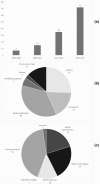Multi-criteria decision analysis for health technology assessment: addressing methodological challenges to improve the state of the art
- PMID: 31006056
- PMCID: PMC6652169
- DOI: 10.1007/s10198-019-01052-3
Multi-criteria decision analysis for health technology assessment: addressing methodological challenges to improve the state of the art
Abstract
Background: Multi-criteria decision analysis (MCDA) concepts, models and tools have been used increasingly in health technology assessment (HTA), with several studies pointing out practical and theoretical issues related to its use. This study provides a critical review of published studies on MCDA in the context of HTA by assessing their methodological quality and summarising methodological challenges.
Methods: A systematic review was conducted to identify studies discussing, developing or reviewing the use of MCDA in HTA using aggregation approaches. Studies were classified according to publication time and type, country of study, technology type and study type. The PROACTIVE-S approach was constructed and used to analyse methodological quality. Challenges and limitations reported in eligible studies were collected and summarised; this was followed by a critical discussion on research requirements to address the identified challenges.
Results: 129 journal articles were eligible for review, 56% of which were published in 2015-2017; 42% focused on pharmaceuticals; 36, 26 and 18% reported model applications, issues regarding MCDA implementation analyses, and proposing frameworks, respectively. Poor compliance with good methodological practice (< 25% complying studies) was found regarding behavioural analyses, discussion of model assumptions and uncertainties, modelling of value functions, and dealing with judgment inconsistencies. The five most reported challenges related to evidence and data synthesis; value system differences and participant selection issues; participant difficulties; methodological complexity and resource balance; and criteria and attributes modelling. A critical discussion on ways to address these challenges ensues.
Discussion: Results highlight the need for advancement in robust methodologies, procedures and tools to improve methodological quality of MCDA in HTA studies. Research pathways include developing new model features, good practice guidelines, technologies to enable participation and behavioural research.
Keywords: Health technology assessment; MCDA modelling; Methodological challenges; Methodological quality; Multi-criteria decision analysis; Systematic review.
Figures




Similar articles
-
The Use of MCDA in HTA: Great Potential, but More Effort Needed.Value Health. 2018 Apr;21(4):394-397. doi: 10.1016/j.jval.2017.10.001. Epub 2017 Nov 22. Value Health. 2018. PMID: 29680094
-
Avoiding and identifying errors in health technology assessment models: qualitative study and methodological review.Health Technol Assess. 2010 May;14(25):iii-iv, ix-xii, 1-107. doi: 10.3310/hta14250. Health Technol Assess. 2010. PMID: 20501062 Review.
-
Multicriteria decision analysis (MCDA) for health technology assessment: the Queensland Health experience.Aust Health Rev. 2019 Oct;43(5):591-599. doi: 10.1071/AH18042. Aust Health Rev. 2019. PMID: 30205873
-
Multiple criteria decision analysis in the context of health technology assessment: a simulation exercise on metastatic colorectal cancer with multiple stakeholders in the English setting.BMC Med Inform Decis Mak. 2017 Oct 26;17(1):149. doi: 10.1186/s12911-017-0524-3. BMC Med Inform Decis Mak. 2017. PMID: 29073892 Free PMC article.
-
Multicriteria Decision Analysis to Support Health Technology Assessment Agencies: Benefits, Limitations, and the Way Forward.Value Health. 2019 Nov;22(11):1283-1288. doi: 10.1016/j.jval.2019.06.014. Epub 2019 Oct 16. Value Health. 2019. PMID: 31708065
Cited by
-
Multiple criteria decision analysis for therapeutic innovations in a hemophilia care center: A pilot study of the organizational impact of innovation in hemophilia care management.PLoS One. 2022 Sep 9;17(9):e0273775. doi: 10.1371/journal.pone.0273775. eCollection 2022. PLoS One. 2022. PMID: 36084067 Free PMC article.
-
Health technology assessment (HTA) and performance management (PM): a scoping review on the intersecting realms.BMC Health Serv Res. 2025 Jul 3;25(1):917. doi: 10.1186/s12913-025-12879-3. BMC Health Serv Res. 2025. PMID: 40611138 Free PMC article.
-
Modelling Informal Carers' Health-Related Quality of Life: Challenges for Economic Evaluation.Appl Health Econ Health Policy. 2024 Jan;22(1):9-16. doi: 10.1007/s40258-023-00834-4. Epub 2023 Nov 10. Appl Health Econ Health Policy. 2024. PMID: 37948034 Free PMC article. Review.
-
Recalibrating Health Technology Assessment Methods for Cell and Gene Therapies.Pharmacoeconomics. 2020 Dec;38(12):1297-1308. doi: 10.1007/s40273-020-00956-w. Pharmacoeconomics. 2020. PMID: 32960434
-
Hospital Investment Decisions and Prioritization of Clinical Programs.Cureus. 2025 Mar 3;17(3):e79998. doi: 10.7759/cureus.79998. eCollection 2025 Mar. Cureus. 2025. PMID: 40182326 Free PMC article. Review.
References
-
- Velasco-Garrido M., Busse R.: Health Technology Assessment: An Introduction to Objectives, Role of Evidence, and Structure in Europe, in Policy Brief, World Health Organization and European Observatory on Health Systems and Policies, Editors. European Observatory on Health Systems and Policies: Copenhagen (2005)
-
- Sorenson C., Drummond M., Kanavos P.: Ensuring value for money in health care: the role of health technology assessment in the European Union. World Health Organization and European Observatory on Health Care Systems (2008)
-
- HTAi-INAHTA (2017) HTAglossary.net. http://htaglossary.net/Health+Technology+Assessment+%28HTA%29&highlight=.... cited 12th May 2017
-
- Drummond M, Tarricone R, Torbica A. Assessing the added value of health technologies: reconciling different perspectives. Value Health. 2013;16(S1):7–13. - PubMed
-
- OECD . New health technologies. Paris: OECD Publishing; 2017.
Publication types
MeSH terms
LinkOut - more resources
Full Text Sources

